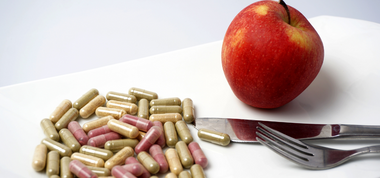Is 10,000 really the optimal number of steps?

Quick: How many steps have you walked today?
If you know the answer to that question, you’re not alone! FitBit has over 31 million active users - and it’s far from the only activity tracker. And the vast majority of people counting their steps are aiming for the same number: 10,000.
But why 10,000? Turns out, there’s not a great reason. In the 1960s the first commercially available pedometer was brought to market by a Japanese company who called it the “Manpo-kei” (which translates to 10,000 step meter) because they liked the sound of the name. A Japanese health professor then promoted walking to reduce obesity using that same 10,000-step meter. The idea caught on.
Recently, researchers have looked into the question of the optimal number of steps. At least three studies in recent years have estimated thresholds to aim for, especially if your health goal is healthy longevity. The consistent and surprisingly good news? It seems to be less than 10,000! All of the research found that somewhere in the neighborhood of 7,000 to 8,000 steps every day is probably enough for increasing your odds at living longer.
For those of you who don’t track your steps (including bikers and swimmers), 7,000-8,000 steps equates to about 30-45 minutes of moderate exercise.
There’s no denying that exercise is great for your heart. Not only does exercise promote weight loss for those who need it, but it also helps reduce blood pressure and LDL (bad) cholesterol levels while raising HDL (good) cholesterol levels. And just like eating well, there are unexpected benefits to exercising. In addition to reducing risk for heart disease, people who exercise regularly sleep better, experience less stress, maintain a sharper memory, higher self-confidence and even better sexual function.
A critical point: the health risks of not moving at all are the highest. So if you do nothing at all right now and 30 to 45 minutes seems overwhelming, just do something. Start with 5 minutes of exercise today and increase the duration by 1 minute per day every day – or even one minute per day every week. Whatever seems doable. Before you know it, you’ll be at your 30 to 45 minutes per day! You don’t have to get there overnight.
And which exercise should you choose? The real key to exercise, as I tell my patients, is finding the activity you enjoy. If that’s walking – walk. If it’s swimming - swim. If it’s dancing – dance. If it’s biking – bike. Just move your body through space aiming to get to at least that 30-45 minutes (or 7000 – 8000 steps) each and every day.
Does this all mean that if we’re currently doing 10,000 steps we should slow down? Absolutely not! The point of this blog is not to discourage you from doing more. Physical activity is good for you, period. And the more the better (though I admit at some point the health benefits of exercise level off and may even be counterproductive – the iron man triathlete is unlikely to experience much incremental health benefits over the regular triathlete while exposing themselves to more wear and tear and injury risk).
The point of this week’s blog is to let you know that even if you’re not getting to 10,000 steps each day, you’re still helping your heart and your health by just getting to 75% of that 10k benchmark! Just as for diet, you don’t have to be perfect – you just have to be better.
As for me, I started a regular exercise routine 3 and ½ years ago. I went from a pretty sedentary person to someone who runs a 5k each day. It took me many months to get to that fitness level but what I can tell you is that I would never go back. I’m objectively fitter than I was in my 30s and I feel 20 years younger.
You can too!

Tested & Proven Results.
- Cardiologist formulated
- Supported by over 500 publications
- Clinically-proven, in a double-blind randomized trial with Mayo Clinic and The University of Manitoba
80% of participants lowered their cholesterol in just 30 days. With just two servings per day, Step One Foods offers a proven-effective way to naturally lower LDL (bad) cholesterol.
Get heart health tips and articles like this, delivered right to your email.
New articles every week.
You may also like...

Supplements for cholesterol lowering? Not so fast.

You don’t need to avoid foods with cholesterol…except for these



